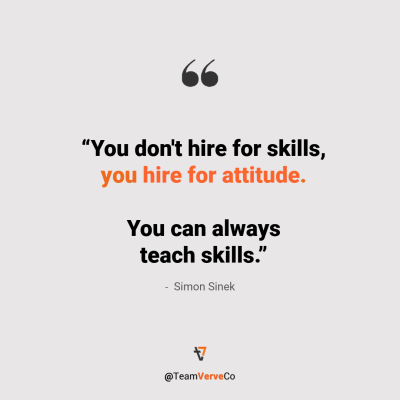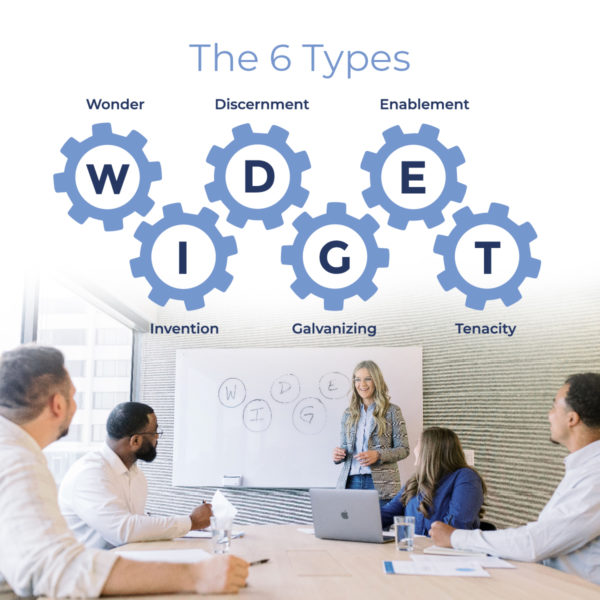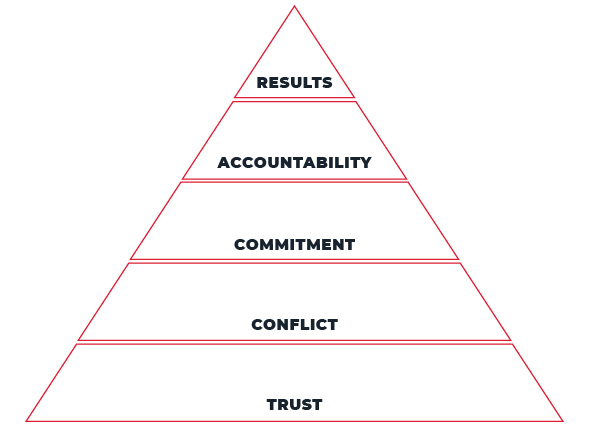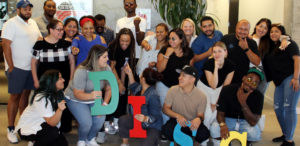How deep is your bench? What would it take to build a high-performance team at your organization? Does your hiring program intentionally look for team players? And help them get to the right seat on the bus? Let’s explore three steps needed for building a high-performance team!
Step 1: Hire Ideal Team Players!
In life, we work in teams. Why is this important?
This acronym came across my desk recently, and it resonated with my life and experience:
T – Together
E – Everyone
A – Achieves
M – More
Think about the teams you’ve been part of—family, church, community organizations, workgroups, leadership teams, and so on.
Which teams worked best together? The ones where one or more players appear to be in a free for all…or the ones brimming with team players?
In his book The Ideal Team Player, Patrick Lencioni identifies three building blocks of the best kind of teammates—
- Humble: They share credit and celebrate the teams’ collective win. They are also comfortable being honest about their own skills and strengths.
- Hungry: They are motivated and diligent. They go above and beyond to contribute to the team.
- Smart: They are emotionally intelligent and exercise great judgment. They have “people skills.”
Using and developing all three of these building blocks forms us into ideal team players! Indeed, these three disciplines taken together can build a high-performance team!
“Great team players lack excessive ego or concerns about status.
They are quick to point out the contributions of others
and slow to seek attention for their own.
They share credit, emphasize team over self,
and define success collectively rather than individually.
It is no great surprise, then, that humility
is the single greatest and most indispensable attribute
of being a team player.”
– Patrick Lencioni
Get to the Heart of Being Humble, Hungry, and Smart
Taking it a step further for leaders, these three keys help identify others who could be ideal team players.
But, how do you get these ideal team players onto your bus (organization) and into the right seat (role) for them?
First, leaders must set an example of the Hungry-Humble-Smart model and develop a healthy work culture around these concepts. This may mean acknowledging improvements needed and seeking out coaching to develop the weaker skill(s).
Then, when hiring, look very closely at the candidates’ behavioral skills and attitudes, not just their technical know-how. Learn to hold better interviews by targeting the questions that get to the heart of being hungry, humble, and smart. Ask probing questions of your candidates and solicit honest feedback from others on their attitude tendencies.
Step 2: Put Your Players in the Right Seat on the Bus!
So now you’ve hired your ideal team player, who lives out the Hungry-Humble-Smart model in their daily work. The right person is definitely on the right bus.
But how do you know if they are in the right seat on the bus? And if they’re not, how do they move to the correct seat quickly for their good and that of the entire team?
This is where Working Genius comes into play! Teams find better fulfillment in their work and optimized performance on their teams when they learn to utilize the innate skills and gifts—or geniuses—of each teammate.
Each of us has Working Geniuses that are considered our sweet spot in work.
Using these gifts gives us joy, energy, and passion.
We also have Working Competencies that neither feed nor drain us.
We tend to engage in activities that require these skills fairly well with limits.
Conversely, our Working Frustrations are areas where we aren’t naturally skilled.
These tend to rob us of joy and energy.
Together the six working geniuses outline the full circumference of any project group—from the starting point of creating ideas and vision (Wonder and Invention) into the deeper dive of truly understanding the work and developing the project team (Discernment and Galvanizing) through seeing the project and the project team to the optimal end result (Enablement and Tenacity).
Teams must work together in a smooth process to achieve results! The tenets of Working Genius help overcome teamwork challenges while giving your team a better way to think about projects, meetings, and hiring.
Maximize Working Genius, Minimize Working Frustration!
How do you determine which ideal skills and gifts are needed in each role at your organization? And, how do you confirm all your employees are in the right seat on the bus?
In an ideal world you would have discerned the geniuses needed for your organization’s open seats prior to opening each hiring window, and every new hire’s areas of genius would fit into their role seamlessly.
If that step was left out somehow, don’t despair! Your team’s gifts and skills can be assessed at any time. An agile organization can shift their bus’s seating chart to optimize their team’s genius.
As you’ve likely guessed, there are tools available to take the mystery out of your team members’ geniuses! This makes it easy for people who work together to identify their talents and the tasks that help them thrive.
Step 3: Build Trust!
So, now we understand how to find ideal team players and how to plug them into the right roles.
But, how do we build and encourage a healthy work culture for the entire team?
One word: TRUST!
Many well-meaning, talented teams lack trust. They are likely afraid of conflict and would rather preserve artificial harmony than risk the healthy vulnerability that leads to trust.
A healthy, functioning team requires a foundation of trust, based on a vulnerability that comes from honest communication. This means creating healthy dialogue around both the things that make us nervous, like conflicting opinions or admitting mistakes, and the things we’re passionate about, like our years of experience or visionary gifts.
Being able to discuss teamwork honestly and come to clear conclusions about how to move forward keeps the entire team accountable to their mission.
This commitment to shared accountability leads to better, measurable results overall.
So, what can we do now to build a high-performance team? Making a team functional and cohesive requires intentional levels of courage and discipline!
Bonus Step 4: Support Your Powerhouse Team!
Ready to build a high-performance team? Putting humble, hungry, and smart team players on the right seat on the bus boosts teamwork and work culture every time!
Did you know that Team Verve Co. offers exciting team-building workshops designed to build on each other? These high-energy, engaging sessions are filled with world-class content and interactive learning for immediate and ongoing application!
Our Ideal Team Player, Working Genius, and Five Dysfunctions of a Team workshops work together to pack a power punch for teams hungry to grow! Your teams can target their most-needed workshop or take all three to maximize their team genius!
if you have questions about any of these tools, we are glad to point you in the right direction.
Chat with Matt!
Team Verve, NYC






